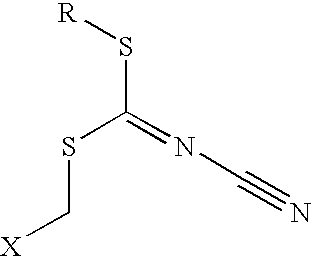Microbicidal Compositions Including A Cyanodithiocarbimate And A Second Microbicide, And Methods of Using The Same
- Summary
- Abstract
- Description
- Claims
- Application Information
AI Technical Summary
Benefits of technology
Problems solved by technology
Method used
Image
Examples
Embodiment Construction
[0018]The present invention provides a composition to control the growth of at least one microorganism comprising a mixture (or a formulation) of a) at least one cyanodithiocarbimate and b) at least a second microbicide selected from an N-alkyl heterocyclic compound; a triazole compound or salt thereof or metal complex thereof; a microbicide with an activated halogen atom or a formaldehyde releasing compound; 1,4-bis(bromoacetoxy)-2-butene; 2-(thiocyanomethylthio)benzothiazole; a methylene-bis(thiocyanate); a halogenated acetophenone; a halopropynl compound; an iodosulfone; a phenol; a halocyanoacetamide compound; a quaternary ammonium compound; or any combination thereof, wherein the cyanodithiocarbimate and the second microbicide can be present in a combined amount synergistically effective to control the growth of at least one microorganism. The composition can provide superior microbicidal activity at low concentrations or other concentrations against a wide range of microorgani...
PUM
| Property | Measurement | Unit |
|---|---|---|
| Time | aaaaa | aaaaa |
| Weight ratio | aaaaa | aaaaa |
Abstract
Description
Claims
Application Information
 Login to View More
Login to View More - R&D
- Intellectual Property
- Life Sciences
- Materials
- Tech Scout
- Unparalleled Data Quality
- Higher Quality Content
- 60% Fewer Hallucinations
Browse by: Latest US Patents, China's latest patents, Technical Efficacy Thesaurus, Application Domain, Technology Topic, Popular Technical Reports.
© 2025 PatSnap. All rights reserved.Legal|Privacy policy|Modern Slavery Act Transparency Statement|Sitemap|About US| Contact US: help@patsnap.com



